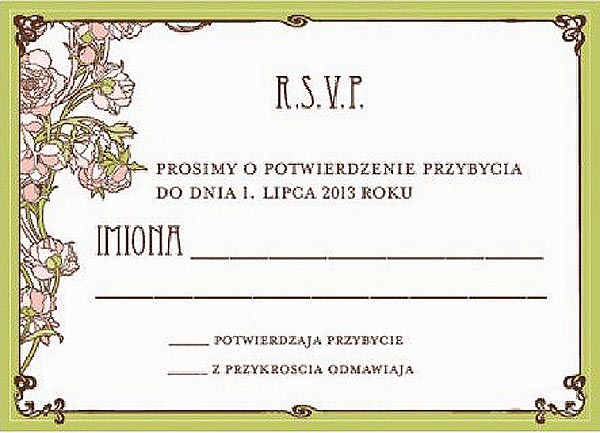 |
| An invitation with "RSVP" clearly marked (Wikipedia) |
Note: In Lessons #01-116 to #01-120, we're looking at French expressions used in English--not the many "borrow words," but "pure French."
Get Ready: What--if anything--is your raison détre?
Today we wrap up the five-part series on French expressions used in English that we started in Lesson #01-116.
Remember, these are terms that still retain their very "French" nature, unlike such words as art, machine, table, and so on, which are now "truly" English.
OK, here's our last list of French expressions in English:
- par excellence: Few stop to realize what "excellent" really means: it means having excelled, "gone past" the others, or past some previously-set benchmark. So something which is "par excellence" is not just good, but actually sets a standard for all others of its type. Thus, "Jackie Chan is the martial arts actor par excellence." [slight accent on the first syllable, full accent on the last: PAR ek-sul-AHNCE]
- prix fixe: A set meal, the opposite of a la carte. Literally "fixed price," there may be some choices or substitutions within the set. [equally accented: pree feeks]
- raison d'etre: Literally "reason for being," it describes the purpose that justifies something's (or someone's) existence. "The customer is our raison d'etre." [This one is especially tough. Try RAY-zone DET-ruh.]
- répondez s'il vous plaît: This is better known through its initials, RSVP, meaning "Please reply." It's used on invitations where a "headcount" is needed, and is often used as a noun: "Have you given us your RSVP yet?" [Seldom spoken in full, usually abbreviated. But try REP-on-DAY see voo PLAY]
- sang-froid: Literally "cold blood," it is the trait of being cool and calm even under great stress or pressure. "Due to his sang-froid, he was rapidly promoted within the company." This is a noun; note that the English adjective "cold-blooded" may be construed as an insult. [equally accented: sahn-FWAH]
- savoir-faire: Meaning something like "know-how" or the cowboy term "savvy," it refers to social grace or ability with people. "Bill wasn't promoted because the bosses felt his lack of savoir faire would affect customer relations." [accent on the last syllable: sav-wah FAIR]
- tête-à-tête: Literally "head-to-head," it refers to a private meeting. "You and I will need to have a tête-à-tête after the clients leave." [accent on the first and last syllable: TATE-uh-TATE
- vis-à-vis: Regarding, compared to, related to; literally "face-to-face," but completely different in meaning from its origins. "How are this quarter's numbers vis-à-vis last quarter's?" [accent on the first and last syllable: VEE-zuh-VEE]
I hope these five lessons have helped you understand some French expressions!
--------Read more: https://en.wikipedia.org/wiki/Glossary_of_French_expressions_in_English
Practice: Match the French words to their meaning in English:
- par excellence
- prix fixe
- raison d'etre
- répondez s'il vous plaît
- sang-froid
- savoir-faire
- tête-à-tête
- vis-à-vis
- the ability to be graceful with people
- the quality of being cool and calm under pressure
- regarding; in relation to
- the very best example of something
- the purpose of something's existence
- a private meeting
- please answer
- a full meal available for a single price
Answers are in the first comment below.
Submitted to the Shenzhen Daily for June 10, 2008
Some of the words in this lesson received 326 visits (and another 173 visits on a re-post) on my old site between June, 2012, and August, 2021.


Answers to the Practice: 1. d; 2. h; 3. e; 4. g; 5. b; 6. a; 7. f; 8. c
ReplyDelete